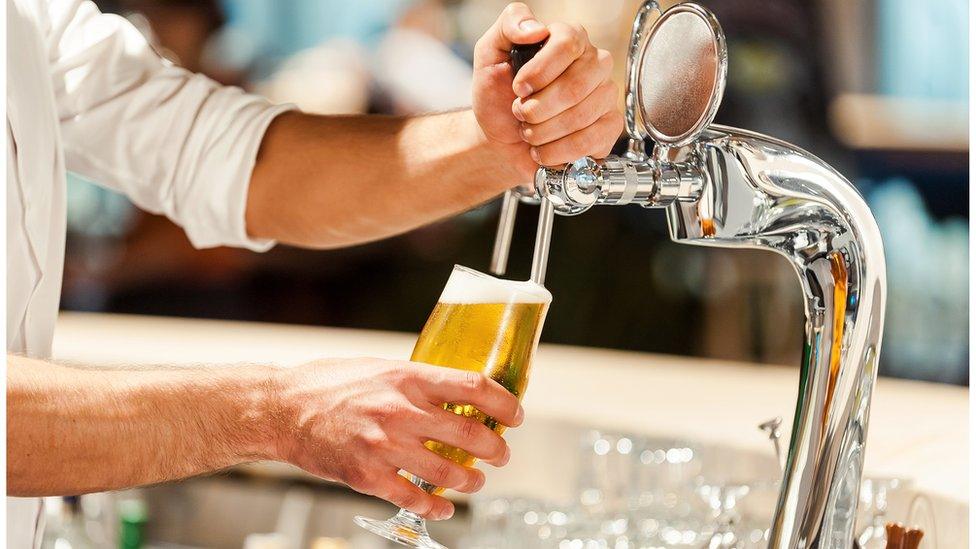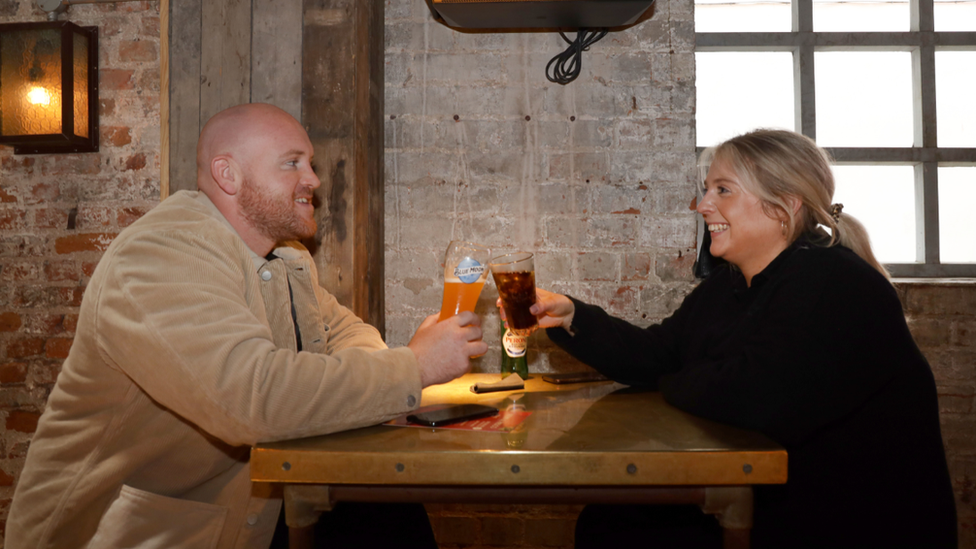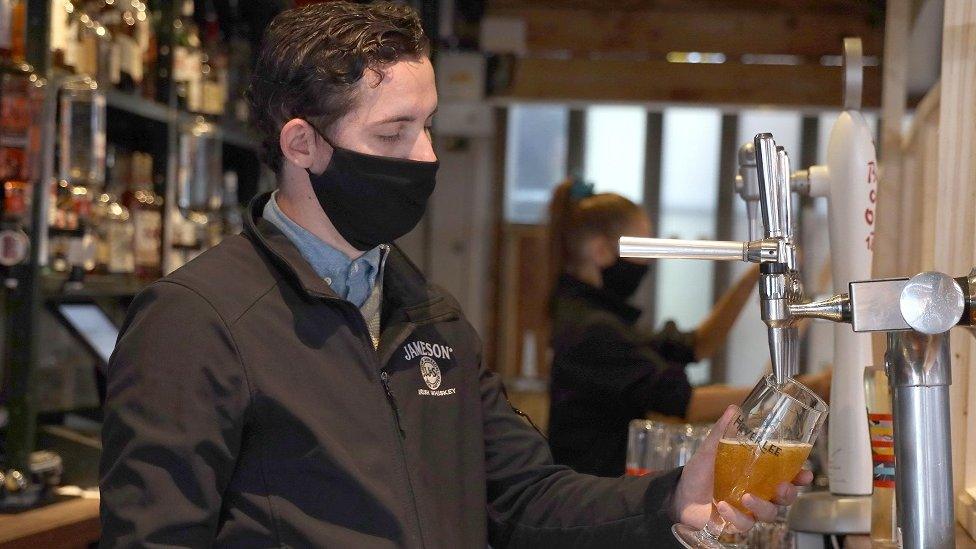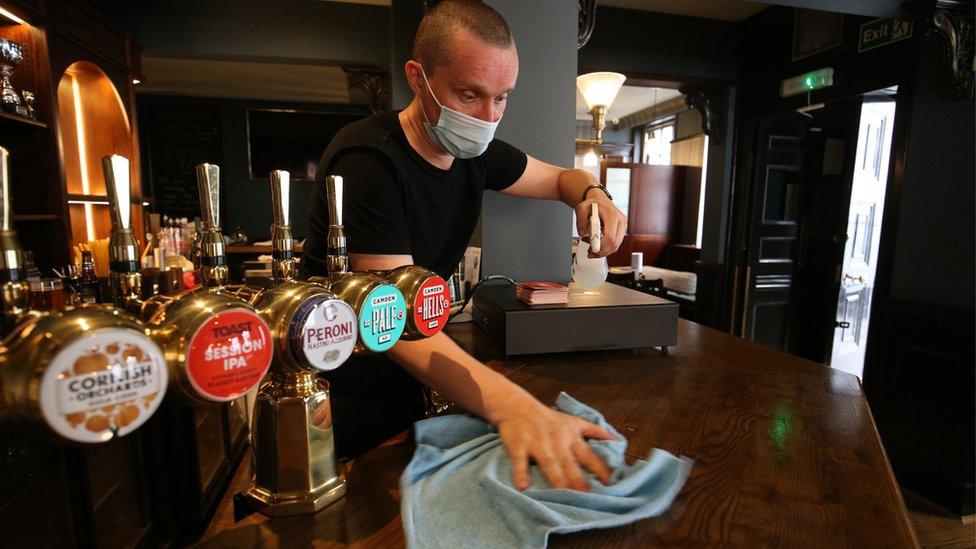Covid pub rules: How NI alcohol laws differ from the rest of the UK
- Published

Pubs will have to close earlier under new rules
The decision by the Northern Ireland Executive to require pubs, restaurants and hotels to close at 23:00 puts NI out of step with the rest of the UK.
While licensing laws differ across the country, Northern Ireland has long had significantly different regulations in place.
One specific element of the law in Northern Ireland - on closing times for shops selling alcohol to take away - has contributed to the executive's decision to go with a closing time of 23:00, rather than 22:00 as per the rest of the UK, although last orders will be at 22:30.
BBC News NI has a look at how the differences in licensing laws has shaped Northern Ireland's response to the rising number of Covid-19 cases.
What does the law say on 23:00 closing times?
Unlike in the rest of the UK, the time at which supermarkets and other shops with off-sales licences must close is set in law.
The law states that they are permitted to sell alcohol for consumption off the premises until 23:00, except on Sundays when they must close at 22:00.
In England and Wales, shops and off-licences can sell alcohol 24 hours a day, meaning no matter what time a curfew was set, there would still be the possibility of people going to buy alcohol elsewhere.

Northern Ireland's drink-only bars reopened on September 23
In Scotland, shops and off-licences must stop selling alcohol at 22:00, which the new rules on pubs and restaurants tie in with.
In the Republic of Ireland, all pubs and restaurants must close by 23:30 following new rules introduced in the wake of the pandemic, while off-licences and supermarkets must stop selling alcohol by 22:00.
Why has this influenced the decision of the executive?
Ministers have been clear that they do not want people leaving pubs and going on to house parties.
If off-licences were open for an hour after pubs closed then people would be able to go there to buy alcohol, increasing the risk that people will continue to socialise indoors at someone's home.
Of course, the Northern Ireland Assembly could amend the law, but this would take time.
What other things are different about NI's licensing laws?
One of the more unusual aspects of alcohol licensing in Northern Ireland is that in order to be granted a licence for a pub or off-licence, you have to present a valid and existing licence to a court.
Courts cannot create a new licence for pubs or off-licences from scratch, which effectively means there are a set number of licences in existence.
If you want to open a business selling alcohol then you have to get your hands on a licence from somewhere else - perhaps another business that is closing down, or which has been stripped of its licence.

Hospitality industry representatives had called on the executive to agree to a curfew of 23:30
There are 13 different types of premises that can be granted alcohol licences in NI, each with different licensing conditions attached.
These are:
pubs
off-licences
hotels
guest houses
restaurants
conference centres
higher education institutions
places of public entertainment
refreshment rooms in public transport premises
seamen's canteens
indoor arenas
outdoor stadia
non-seagoing vessels
What about Easter?
Anyone who has tried to buy a drink in Northern Ireland over the Easter period will know it can be more difficult than you might imagine.
Alcohol may only be sold between on 17:00 and 23:00 on Good Friday and bars have to stop serving at midnight on Maundy Thursday and Easter Saturday.
Why are things different in Northern Ireland?
Many of Northern Ireland's existing licensing laws date back to the Licensing (Ireland) Act of 1902, which was passed by Parliament when all of Ireland was still part of the United Kingdom.
This act prohibited the issue of new licences for the sale of alcohol, with some exceptions.
After Ireland was partitioned into the Irish Free State and Northern Ireland, the law was adapted and remained in force in Northern Ireland from 1923 onwards.
The modern-day Republic of Ireland had similar Easter restrictions before removing them in time for Easter 2018.
These rules stem from Christian beliefs about drinking alcohol at the Easter period, and reflect the historic influence of churches on policymaking across the island.
Are things changing?
Yes - or at least, that is the plan.
In July, the executive announced plans to let pubs and nightclubs in NI serve alcohol for an extra hour - until 02:00 - almost every Friday and Saturday.
All restrictions on Easter would also be removed.
These changes were intended to come into effect by 2021, but it is not clear what affect the coronavirus pandemic may have on them.
- Published29 September 2020

- Published25 September 2020
